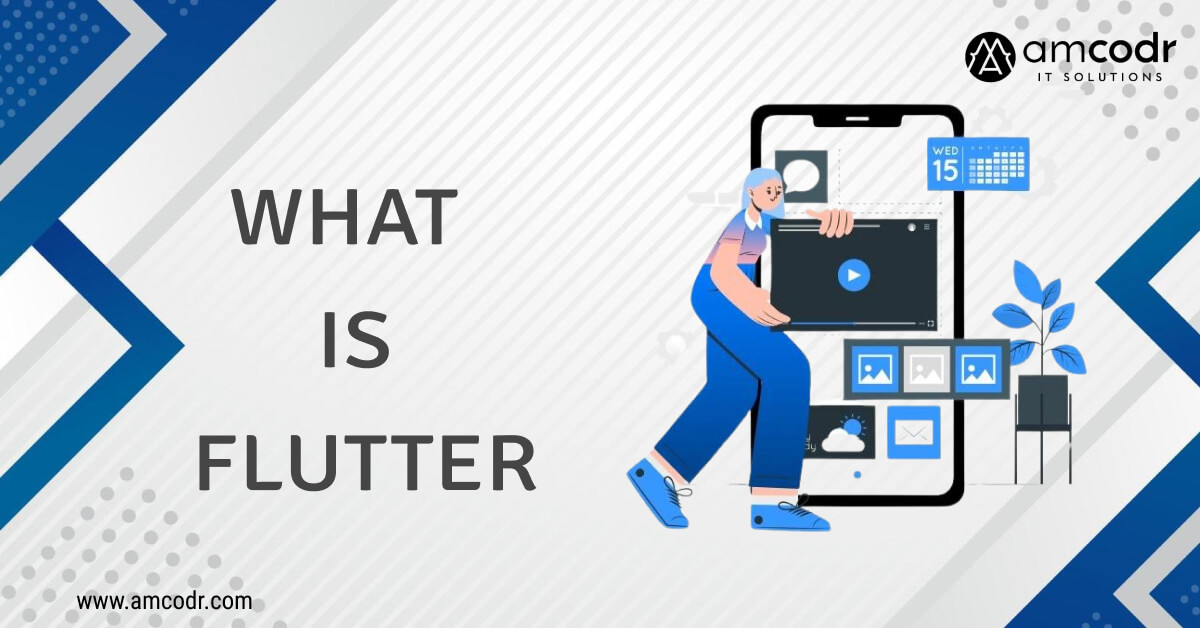Quick Go-Through: Do you want to know "What is flutter?" If yes, then you are on the right page. We will explain everything about the Flutter application development language in detail. So stick to the article.
Flutter is an open-source framework simplifying application development for multiple devices and operating systems. A single coding framework supports various platforms, saving time and money when building a full-fledged mobile application. Flutter is backed by Google technology and resources. Thus, the framework is on a secure platform. The team at Google maintain the code and introduces new features to support future requirements.
Since its launch in 2018, Flutter has become the favourite codebase of front-end and full-stack developers. It offers the developer flexibility to run their application on multiple platforms; hence, a developer can code the application for one platform and use the interface for another without changing the final code.
Initially, the framework supported only mobile app development. However, as community support has grown recently, Flutter can now be used to develop applications for the top six operating systems, including iOS, Web applications, Android, Windows, macOS, and Linux. You can even build a native application using Flutter and run it on all these platforms.
History
Before exploring the fast-growing cross-platform coding language, we should revisit history to know how flutter programing language existed. The Flutter was developed to ease mobile app development as the mobile application ecosystem proliferated. During this time, Flutter has emerged as a trusted business development language. The Flutter toolkit immediately caught the global player's attention with its official launch by YC in 2013.
As the language was growing in the niche market, Google found value in it, and the company acquired Flutter to launch to the world through their platform in May 2017.
Once Flutter received Google's brand tags on its back, the language exploded in the development community. It gained rapid popularity, and more companies started using Flutter to develop their mobile applications. Google kept Flutter's open-source tag intact, allowing many people to leverage the benefits.
The high-value proposition of Flutter has made the codebase more popular among developers because it allows you to build cross-platform applications without special tools. The mobile application works seamlessly on all the major operating systems and devices worldwide. Businesses running online shops would find the benefits of building mobile applications for their users supported by all the primary operating systems.
With Flutter, you can launch Android and iOS applications in one go. Also, keep your customers happy because the interface will be saved wherever users access your application. This reduces confusion when users shift from one operating system to another.
What is Flutter app development?
Flutter made it possible to create an application that supports Android and iOS devices. There is no need to spend time writing separate code for different devices. It saves lots of productive time and helps the developer to complete their project quickly.
According to global statistics, over 2 million developers use the Flutter-based application to build multi-platform-supporting applications. Flutter is an ever-expanding language that receives new updates more often. New features are added to make the codes more secure and bug-free. Using the Flutter coding language, you can quickly build enterprise-grade applications.
What is a flutter app?
A Flutter app is a mobile application developed using the Flutter coding language. These apps are compatible with cross-platform. You do not have to develop a new app for each device; a single app can be launched on all platforms. Launching a mobile business application using Flutter is fast, convenient, and cost-effective.
Benefits of using Flutter
Web developers love programming languages with easy-to-understand syntax, pre-built functions, & Cross-Platform Development Framework. Language consistency in the upgrade creates a more stable environment for the application to develop in the specific programming language. Flutter has a core built to support the developer in making appealing UIs for mobile applications in one go. It means an application built in Flutter can support all six crucial mobile and desktop applications.
It saves the developer significant time and reduces the app's complexity. The cross-platform development framework is easy to integrate with different operating systems.
Native app vs cross-platform app
When mobile applications gained popularity among users, businesses had to make separate applications for each device. Mobile compatibility was the main issue among developed applications. The company used to hire specialized developers to build the mobile app. Flutter application development solves the problem by allowing the developer to build the app for a single platform and use it on all platforms without making any substantial changes. The application can run smoothly on all major platforms.
Fast, Consistent and Customizable
Flutter frameworks is an open-source platform backed by Google technology. It uses Google's open-source Skia graphic library to render the UI resources. These libraries are updated and offer instant access to necessary tools. Using Flutter frameworks, building tools become more convenient, and developers can leverage the high-performing Google tool to build customizable applications. The tools give you a visual appearance during the development platform. So, no matter what your platform is, you can access any application using the development environment.
Developer friendly tools
Google has introduced several upgrades to support Flutter developers in recent years. These upgrades make the development environment more convenient and faster to code. Thus, various tools, such as hot reload, are integrated into the developer environment, which can preview code changes without losing state. Widget inspector is another visual representation tool that helps developers solve UI layout issues.
Programming language of Flutter
Flutter is an open-source language backed by the popular programming language Dart, which Google also backs. It was introduced to make UI building easy. The core features of Dart are integrated into flutter development to strengthen the essential functions.
For example, Dart's "sound null safety" feature is passed in Flutter. It helps the developer identify common bugs called null errors. The new environment can also speed up the mobile application development process. Flutter programming reduces the time it takes to develop the mobile application and focuses on building a customized application to fulfil the user's needs.
Tailor software solutions to suit your business requirements with premier development services.
Get ProposalSummary
The Flutter programming language is the first choice of companies for building mobile applications because it significantly reduces development costs. Since a single application is enough to deploy on all major platforms, the cost of developing the app would be less than building the app for every platform. Besides that, you do not need a massive team to make the application; a few senior-level developers could develop and maintain all the platforms and operating systems. The company can save time on application development and focus on other vital functions.

Avadh Darania

About the Author
With over three years of hands-on experience in Flutter development, Avadh offer expertise in crafting captivating user interfaces that seamlessly align with Material Design and Cupertino style guidelines for both Android and iOS platforms. His proficiency extends to adeptly managing application state using diverse techniques, ensuring clean and scalable codebases.
Beyond technical prowess, he possess a keen eye for UI/UX design, prioritizing visually appealing and user-friendly interfaces through the strategic utilization of libraries and packages. Furthermore, his adeptness in testing, debugging, and version control using Git enables effective collaboration within teams while ensuring prompt issue resolution and meticulous change tracking throughout the development lifecycle.






